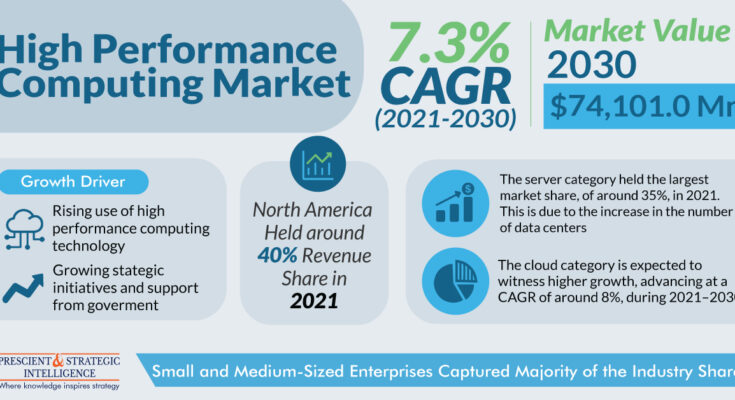The high-performance computing industry generates $39,153.9 million revenue in 2021, and it is projected to generate $74,101.0 million in 2030, rising at a rate of 7.3% from 2021 to 2030. It is attributed to the growing usage of high-performance computing technology in various sectors such as research and academics, healthcare, life sciences, government, and defense, led by the advent of cloud HPC solutions, rising requirement for precise high-speed data processing, and increasing strategic initiatives as well as government support.
High-performance computing is defined as the ability to process data and perform complex calculations at a significant speed. It requires a computer system with a processor of a capacity of 3 GHz to perform around 3 billion calculations per second.
It is quite faster than any other human can achieve. It pales in comparison to HPC solutions, which can perform per-second quadrillions of calculations.
Why is HPC Important?
Groundbreaking scientific discoveries are made through data, which fuels game-changing innovations, with improved quality of life for billions of people around the globe. HPC is the foundation of industrial, scientific, and societal advancements.
Technologies such as AI, IoT, and 3D imaging have evolved, with a massive amount of data growing exponentially. For numerous purposes, such as streaming a live sporting event, testing new products, tracking developing storms, or analyzing stock trends for real-time processing of data.
How Does HPC Function?
HPC solutions possess three major components
• Compute
• Network
• Storage
Compute servers are networked closely into a cluster for building a high-performance computing architecture. Software programs and algorithms function simultaneously on cluster servers.
Similarly, networking components are required to support the high-speed transportation of data between data storage and compute servers. If a component fails to keep up with the rest, then the HPC infrastructure performance suffers.
What is an HPC Cluster?
An HPC cluster consists of hundreds, or thousands of compute servers, which are networked together. Each server is known as a node. The nodes in each cluster function parallel to each other, which boosts the processing speed for high-performance computing delivery.
HPC Use Cases
HPC solutions are utilized for various purposes in numerous sectors. They are deployed on-premises, in the cloud, or at the end.
Research Labs: Scientists utilize HPC for finding renewable energy resources to understand the evolution of the universe, create new materials, and predict and track storms.
Media and Entertainment: HPC is utilized for editing feature films, rendering special effects, and worldwide streaming live events.
Oil and Gas: HPC is utilized for precisely identifying drilling spots for wells, and boosting production from existing wells.
AI and ML: The application of HPC also involve the detection of credit card fraud, and providing self-guided technical support, as well as teaching self-driving vehicles and enhancing cancer screening techniques.
Therefore, the rising usage of HPC in various industries, leads to its increased demand.



